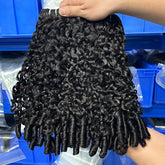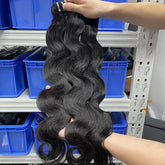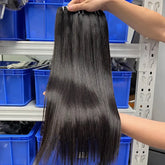Why Ethical Sourcing Matters: How to Explain It to Your Clients

In today’s competitive hair industry, clients are not only asking how much your wigs and extensions cost but also where the hair comes from. With growing awareness about sustainability, ethics, and authenticity, salons, boutiques, and distributors—especially Black-owned businesses—are in a unique position to stand out by showing their commitment to ethical sourcing.
When your clients trust that their hair extensions are responsibly sourced, you don’t just sell products—you build credibility, loyalty, and long-term relationships
Understanding What Ethical Sourcing Really Means
Ethical sourcing in the hair industry goes beyond just quality—it encompasses fair labor practices, transparent supply chains, and sustainable harvesting methods. When you source hair ethically, you're ensuring that the women who donate their hair are compensated fairly and treated with dignity.
Why Your Clients Should Care
Connect Ethics to Quality
"When we source our hair ethically, we're not just doing the right thing—we're getting the highest quality product. Hair that's donated voluntarily and processed in fair-trade facilities maintains its integrity better than hair obtained through exploitative means."
Share the Human Story
"Every bundle of hair in our salon represents a woman's choice to share her natural beauty with you. When we ensure she's fairly compensated, we honor both her sacrifice and your investment."
Real-World Success Stories
Crown Jewel Hair Boutique, Atlanta
Strategy: "Transparent Source" program with client education materials showing hair origins
Implementation: Monthly source stories, transparency cards, donor community photos
Result: 40% increase in client retention, 25% boost in transaction value
Natural Grace Hair Extensions, Chicago
Strategy: Direct partnerships with women's cooperatives in Brazil
Implementation: Partnership certificates for salons, stylist training materials
Result: Expanded to 150+ salon partnerships, became preferred premium supplier
Heritage Hair Studio, Detroit
Strategy: "Beautiful Beginnings" program donating proceeds to education
Implementation: Impact stories, annual reports, client appreciation events
Result: 60% client referral rate, local lifestyle media coverage
Actionable Steps to Implement
Step 1: Audit Your Supply Chain
- Research current suppliers
- Ask about donor compensation practices
- Verify working conditions
- Request transparency documentation
Step 2: Create Your Narrative Framework
- Quality Connection: "Ethically sourced hair lasts longer"
- Values Alignment: "Your choices support women's empowerment"
- Exclusivity Factor: "Join our conscious beauty community"
Step 3: Develop Client Education Materials
- Info cards explaining sourcing process
- Before-and-after journey photos
- Social media supplier content
- Impact update newsletters
Step 4: Train Your Team
- Role-play client conversations
- Create talking points
- Develop price objection responses
- Practice storytelling techniques
Step 5: Price Appropriately
Present ethical sourcing as an investment in superior quality, positive impact, and values alignment.
Overcoming Common Objections
"Why should I pay more?"
"The investment ensures highest quality and supports fair practices. Ethically sourced hair typically lasts 2-3 times longer."
"How do I know it's really ethical?"
"We're happy to share our supplier certifications and impact reports. Transparency is core to our values."
"Does it really make a difference?"
"Absolutely. Here's how your last purchase contributed to [specific impact example]."
Building Long-Term Brand Loyalty
Create ongoing touchpoints that reinforce your values:
- Quarterly impact reports
- Social media highlighting partnerships
- Values-based client appreciation events
- Referral programs emphasizing shared values
Measuring Success
Track both business and impact metrics:
- Client retention rates and transaction values
- Referral generation
- Social media engagement
- Community impact metrics
Key Takeaway
Ethical sourcing isn't just about doing good—it's about building a sustainable, profitable business that attracts values-driven clients willing to pay premium prices. By connecting ethical practices to superior quality and personal values, you create a compelling brand story that differentiates your business in a crowded market.
The most successful hair businesses understand that today's clients want to feel good about their purchases. When you make ethical sourcing a core part of your brand story, you're not just selling hair services—you're offering clients a way to express their values through their beauty choices.
Start with one small step: ask your current supplier about their sourcing practices. Your journey toward ethical sourcing—and the premium brand positioning it enables—begins with that first conversation.







